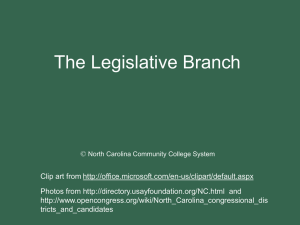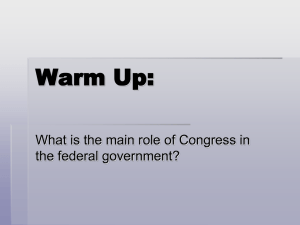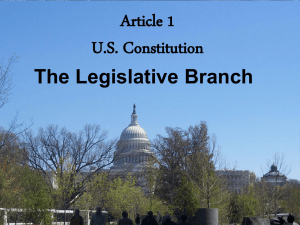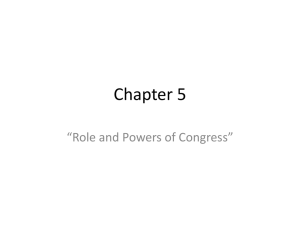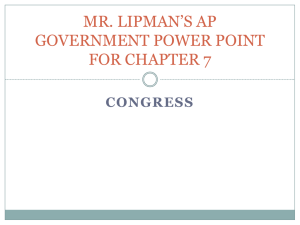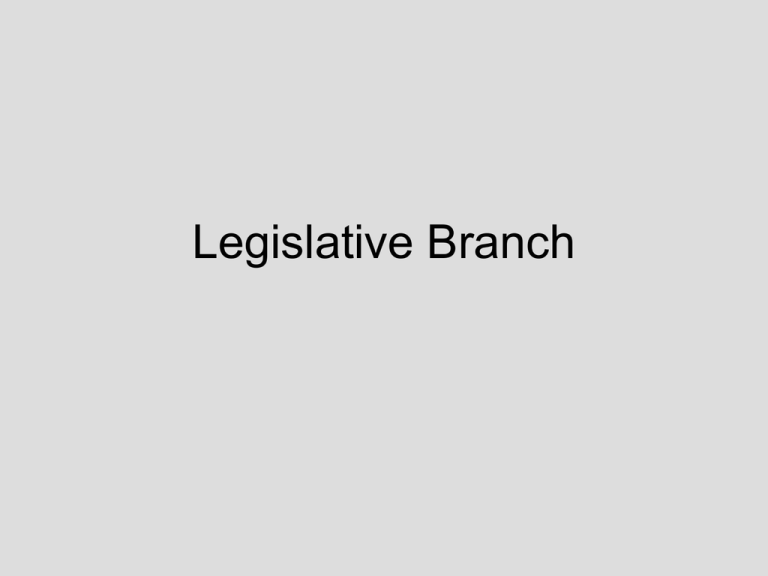
Legislative Branch
Political Ideology
• A consistent set of beliefs about what
policies government ought to pursue.
Liberal and Conservative
• Take liberal or conservative test
If you scored
• 13-20: Very liberal
• 21-29: Somewhat liberal
• 30-35: Moderate
• 36-44: Somewhat Conservative
• 45-52: Very Conservative
Liberal
• Active national government would
intervene in the economy, create social
welfare programs, and help labor unions
gain bargaining power.
Conservative
• A less active government that favors free
market, states rights, and greater reliance
on individual choice in economic affairs.
Ideological Differences
Liberal
• Pro Choice
• Against death
Penalty
• Allow same
sex marriage
• Legalize
marijuana
Conservative
• Pro Life
• For Death
Penalty
• Prohibit same
sex marriage
• Marijuana
illegal
Liberal
Conservative
• Less religion in • More religion in
school
school
• More gun
• Less gun
regulations
regulations
• Allow flag
• Prohibit flag
burning as
burning
speech
Economic differences
Liberal
•
•
•
•
Big government
More welfare
More Taxes
Increase
minimum wage
• Support workers
and unions
Conservative
•
•
•
•
Small government
Less welfare
Tax cuts
Lower or eliminate
minimum wage
• Support business
owners
Other differences
Liberal
• More
environmental
protections
• Less military
spending
• Support gov’t
health care
• Poor
Conservative
• Less
environmental
protections
• More military
spending
• Oppose gov’t
health care
• Rich
Pew research and PBS test
• Political Ideology test
• Interest Groups: An organization of
people sharing a common interest or goal
that seeks to influence the making of
public policy.
• Interest groups
Lobbyist
• a person who tries to influence legislation
on behalf of a special interest;
Example
Lets say that there are 9 members
of the Brandon Valley school board
And a Superintendant
• A majority vote of the school board and
approval of the Superintendent is needed
to pass the policy
• The school board is considering making a
new policy that allows all BVHS students
to have open lunch.
Interest Groups
•
•
•
•
•
•
•
•
School Lunch Program
Students
Parents
Gas stations/convenience stores
Restaurants
Law Enforcement
General Public
Teachers
Would each be for or against the
proposed policy? Why?
•
•
•
•
•
•
•
•
School Lunch Program
Students
Parents
Gas stations/convenience stores
Restaurants
Law Enforcement
General Public
Teachers
Policy changes that lobbyist have
tried to get into the policy if it
passes
Try to determine who would lobby in favor of
the following changes to the policy.
Can only walk (no vehicles)
• Who would want this?
• Who would be against this?
Only for Juniors and Seniors
• Who would want this?
• Who would be against this?
Lengthen lunch to an hour
• Who would want this?
• Who would be against this?
The open lunch rule didn’t pass.
Lets say that there are 9 members
of the Brandon Valley school board
What could they do differently?
• In the next election, help get people
elected who already support open lunch
PAC’s
• PAC stands for Political Action Committees
• They are the political wing of Interest Groups
• PAC’s use money collected from members of
Interest Groups to help candidates who
share their views.
• PACs give money to candidate who
support their cause
• Conservative PACs will typically give
money to Republican candidates
• Liberal PACs will typically give money to
Democratic candidates
• The more money and members a Interest
Group has equates to more power and
influence.
• OpenSecrets.org
Congress
Bicameral
• Having two legislative chambers
House of Representatives
qualifications for HR
• 7 years a citizen of the
• Must be at least 25 years old
• resident of the state elected from
the term of office for members of
the House of Representatives
• 2 years
How many total seats are there in
the House of Representatives?
• 435
House of Representatives
(435 seats)
• Party Divisions (September 14, 2014)
• 234 Republicans
• 201 Democrats
• 0 Independents
• 0 vacancies
•
Representation in the HR is base
on
• Proportional representation
Proportional Representation
Means…
• Representation is based on
population
• The more populated states get more
members of the House
• No state can have fewer than 1
• A census is taken every 10 years for
the purpose of Reapportionment
Reapportionment after 2000 census
Minnesota House Districts
Kansas HR Districts
Indiana
Louisiana
What is an Incumbent
• The existing holder of a
political office
• Congress approval rating
Incumbency re-election rate in
Congress
Gerrymandering Videos
• Explaining gerrymandering (4:30 long)
• Safe districts (start at minute 4) (2:30 long)
• Daily show explains gerrymandering (5:30 long)
South Dakota Representative
Kristi Noem (Republican)
Speaker of the House
• Presiding officer and most powerful leader
in the House of Representatives
• Always comes from the majority party
Speaker of the House
John Boehner Republican Ohio
Senate
Other qualifications for Senate
• 9 years a citizen of the US
• Must be at least 30 years old
• resident of the state elected from
the term of office for members of
the Senate is
• 6 years
How many total seats are there in
the Senate?
• 100
Senate Today
100 seats
Party Divisions
(as of September 14, 2014)
• 53 Democrats
• 45 Republicans
• 2 Independent (lean left)
• Senator Joseph Lieberman of Connecticut
was reelected in 2006 as an Independent,
and became an Independent Democrat.
• Senator Bernard Sanders of Vermont was
elected as an Independent
Representation in the Senate is
based on
• Equal representation
Senate Leadership
The Constitution states that…
• The Vice President is the head of the
Senate
• However, they can only vote if there is a
tie
Vice President
Joe Biden
(Dem)
Delaware
Tie
breaking
votes
When the VP is not around the
presiding officer is the …
• Pres Pro Tem
• Today, a strictly honorary position
President Pro Tempore
Leahy, Patrick J.
(D-VT),
The real power in the Senate is the
• Senate Majority Leader
• Most powerful position in the Senate
• Always comes from the majority party
Senate Majority Leader
Harry Reid
(Dem)
Nevada
Senate Minority Leader
Mitch McConnell
(Rep) Kentucky
South Dakota Senators
Tim Johnson
(Dem)
John Thune
(Rep)
House of Representatives
Senate
2 years term
6 year term
Represent state
Represent district
Elected by
people of state
435 members
At least 25 years old
Proportional
representation
Speaker of HR
Represent state
Bring up charges in
impeachment
No filibuster
At least 30 years old
Equal
representation
Share enumerated
powers
Make laws
100 members
VP and Majority
leader
Jury in
impeachment
Allow filibuster
Confirmation of judges
Ratify treaties
POWERS
OF
CONGRESS
Powers of Congress
• Implied Powers
Enumerated Powers
• Powers specifically given to Congress and
listed in the Constitution
• Example: Raise and army and navy
Implied Powers
• Powers that are hinted at but not
specifically listed in Constitution.
• The originate from the “necessary and
proper clause” and must to related to an
enumerated power.
• Example: Draft
Money Powers
*(1)Power to tax (must be uniform
throughout country)
*(2)Power to borrow money
*(3)Regulate commerce
*(4)Laws on bankruptcies
(also set rules for citizenship)
(5)Coin money (standards for weight
and measurement)
*(6)Punishments for counterfeiters
Military Powers (Ensures civilian
control of the military)
*(11)Declare war
*(12-13)Raise army and navy
*(12)Funding for military
*(14) Set Rules for
military
*(15-16)Rules for militia and power to
call into service
Misc. Powers
*(7)Post offices and roads
*(8)Copyrights and patents
*(9)Establish federal courts
(17)*Laws for Washington, DC
Necessary and Proper
(18) Can make All laws that are
necessary and proper
“Power of the Purse”
• All Taxing, spending, borrowing of money
is done by Congress
Confirmation Power
• All Presidential appointments must be
confirmed with a majority vote of the
SENATE
Ratification Power
• All treaties must be approved with a 2/3rds
vote of the SENATE
Impeachment
Who can be impeached?
• President
• Vice President
• Federal judges
What can they be impeached for?
• Treason
• Bribery
• High Crimes (felony)
• Misdemeanor
Role of Congress in impeachment
• House of Rep.
• Votes to
impeach
• Majority vote
• Senate
• Serves as the
jury
• 2/3rds vote to
convict
Punishment:
• Kicked out of office
• Prevented from holding political office.
• President Andrew Johnson
became the first President of
the United States to be
impeached by the House of
Representatives. He was
impeached in 1868 for
dismissing Secretary of War
Edwin Stanton without the
approval of the Senate as
required in the Tenure of Office
Act and for attacking
congressional policies on the
Reconstruction in the South.
• In October of 1998 the House of
Representatives voted to start a
formal impeachment inquiry into
charges brought by independent
counsel Kenneth Starr alleging
that President William Jefferson
Clinton committed impeachable
offenses, including perjury and
obstruction of justice. The
charges stemmed from an
investigation of Clinton's efforts
to conceal an extramarital affair
with a White House intern named
Monica Lewinsky.
Congressional Record
How a bill becomes a law
Senate Today
100 seats
Party Divisions
(as of September 14, 2014)
• 53 Democrats
• 45 Republicans
• 2 Independent (lean left)
House of Representatives
(435 seats)
• Party Divisions (Sept 14, 2014)
• 201 Democrats
• 234 Republicans
• 0 Independents
• Senate Committees
• House Committees
Committees
• 1. Hold hearings of outside experts
• 2. Change the bill with a majority vote
• 3 Vote on the bill. It takes a majority vote
to pass
Floor Vote
• 1. Debate the bill
– HR Floor debate
– Senate debate
• 2. Change the bill with a majority vote
• 3. Vote on the bill. A majority vote is
needed to pass.
Filibusters
• Only allowed in the Senate
• Traditional
• Double Track Legislation
• Cloture Rule
Famous Filibusters
• During the 1930s, Senator Huey P. Long
effectively used the filibuster against bills
that he thought favored the rich over the
poor. The Louisiana senator frustrated his
colleagues while entertaining spectators
with his recitations of Shakespeare and his
reading of recipes for "pot-likkers." Long
once held the Senate floor for fifteen hours
Famous Filibusters
• South Carolina's J. Strom Thurmond who
filibustered for 24 hours and 18 minutes
against the Civil Rights Act of 1957.
• He read recipes and names out of a phone
book for part of the time.
To the 2nd house
• Exact same steps as first house
Conference committee
• Members from both houses that try to
come up with a version of the bill that both
houses can agree with.
• Is needed because the bill may have been
changed throughout the process and both
houses must pass an identical bill
Floor Vote (Again)
• Both houses must pass the exact same
bill.
• They can do the following:
• 1. Debate
• 2. Vote (it takes a majority vote to pass)
• NO CHANGES can be made on the bill
anymore.
1. Sign the bill
• The bill becomes law
2. Veto the Bill
• The President rejects the bill
• Overriding a veto
• The bill can still become law if each house
of Congress passes the bill with a 2/3rds
vote
3. Do nothing
• 1. Bill becomes law after 10 days
• 2. Pocket Veto
– If congress adjourns then the bill dies after 10
days
• Presidential Vetoes

